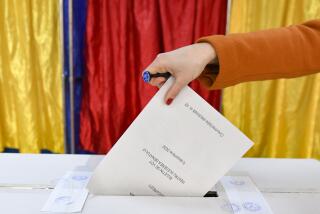THE PULSE OF EUROPE : From May to September: How the Poll Changed
- Share via
They’ve been called the “Three Days that Shook the World.”
But last month’s Soviet coup and the countercoup that followed don’t seem to have jolted Russian political attitudes nearly as dramatically as that reference might suggest, according to an extensive telephone survey among 1,035 residents of Moscow and Leningrad commissioned by the Times Mirror Center For the People & The Press.
The biggest change from a comparable poll conducted in those same cities last May is a sharp jump in the popularity of the two men who emerged as the extraordinary drama’s big winners--Soviet President Mikhail S. Gorbachev and Russian Federation President Boris N. Yeltsin.
While Gorbachev registered the biggest improvement, he started from a much lower rating than his Russian alter-ego, and the latest poll showed that by an overwhelming 45% to 6% margin, people have more confidence in Yeltsin as the man who can solve the country’s problems.
A narrow majority of 51% of those polled described their own political views as “close” to Yeltsin’s, compared with 15% who said they were more conservative than the Russian Federation leader and 11% who said they were more liberal. Asked if they would be ready to suspend the Russian Parliament so that Yeltsin could make decisions about how to solve the nation’s problems without interference, however, 53% were opposed compared with 26% in favor and 21% undecided.
Other highlights of the September survey:
* Most Russians want both the army (by 57%) and nuclear weapons (63%) controlled by central authorities, in some reconstituted union, rather than by Russia or another republic;
* Fear of civil strife has increased, with 41% now fearing civil war either within Russia or between republics;
* Half of those questioned say the Ukraine and Byelorussia should be required to become part of a new nation with Russia if it leaves the Soviet Union, compared with only 34% who said the other Slavic republics should be allowed their independence as well;
* Most Russians (62%) prefer that their republic remain part of the Soviet Union, albeit with much more independence and authority.
RUSSIANS RATE THEIR OPTIONS Some comparisons of Russian attitudes last May compared with today. What Changed
May 1991 September 1991 Approve of how Boris Yeltsin is handling job as Russian Federation president: 55% 78% Rate Mikhail Gorbachev “very” or “mostly” favorably: 30% 56% Rate Boris Yeltsin “very” or “mostly” favorably: 74% 85% Believe certain political parties should be outlawed: 52% 38% Are most concerned about civil warfare: 34% 41%
What Hasn’t Changed
May 1991 September 1991 Are most concerned about severe economic problems: 29% 29% Want Russia to become completely independent country: 24% 27% Rate the Communist Party “very” or “mostly” unfavorably: 69% 71% See democratic form of government as best way to solve country’s problems: 55% 53% See “strong hand” as best way to solve country’s problems: 38% 35% Would like to see Russia continue as socialist society: 13% 6% Favor more democratic type of socialism in Russia: 29% 24% Would like to see modified form of capitalism such as found in Sweden: 30% 30% Favor free-market capitalism of the U.S. or German type: 19% 20%
More to Read
Sign up for Essential California
The most important California stories and recommendations in your inbox every morning.
You may occasionally receive promotional content from the Los Angeles Times.













